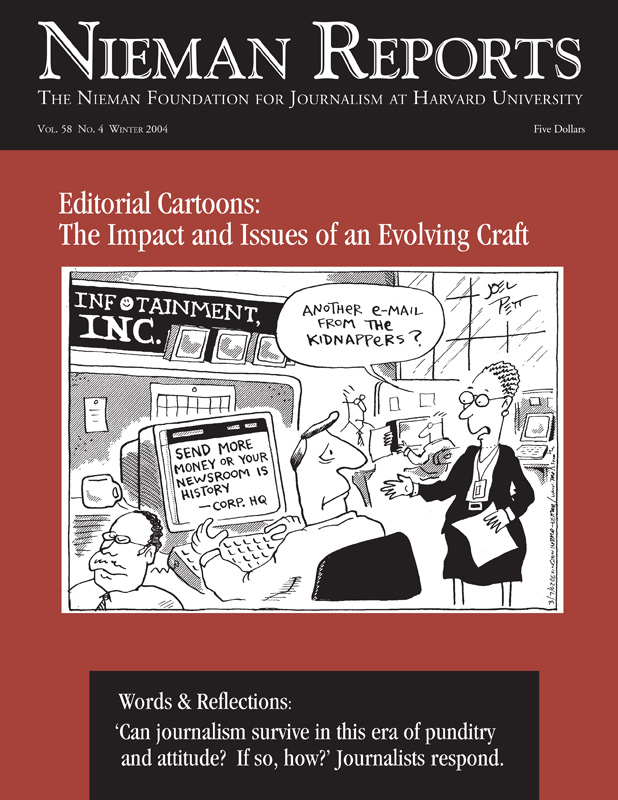Some things are better done late than never. The advisory board to the Nieman Foundation is an example.
Down through the years, Nieman Fellows, news executives, leading journalists, and members of the Harvard faculty have served the interests of the Nieman program effectively in a variety of ways. When I arrived at Lippmann House in August 2000, the advisory board had been dormant for some time. I wrote to thank its members for their service, intending to reconstitute a new board to help me think about the direction of the program and offer sound advice on the foundation’s goals.
As things happen, as Curator of the Nieman Foundation I quickly became engrossed in adding a new wing on Lippmann House, developing a program in narrative journalism, building a Web site for watchdog journalism, introducing a series of conferences for journalists, and attending to the many details of guiding the fellows through an enriching year at Harvard. Months became years and the good intent to organize an advisory board was never acted on.
Earlier this year, it was clear that we now had a purpose and a mission for an advisory board; organizing one became an urgent reality. With some changes in place, and others being considered, and with funds to raise for Nieman Fellowships and to pay off the cost of constructing the new wing, it was evident the staff and I needed the wise counsel that a group of advisors could provide.
On a crisp, sunny morning in early November, 16 members of the 26 advisory board members gathered around a table in the Knight Center conference room to begin their work. It was a lively session with pointed questions and thoughtful comments reacting to the vision I outlined for the Nieman Foundation and remarks by Barry Sussman, editor of niemanwatchdog.org, Mark Kramer, director of the Nieman Program on Narrative Journalism, and Melissa Ludtke, editor of Nieman Reports.
Brandt Ayers of the Anniston Star said to Mark, at “our little paper,” we can afford narrative journalism articles “about once a year.” But it’s “just stunning” when we can break someone away to “do it your [Mark’s] way.”
“There are lots of short-form narratives,” Mark explained. “It’s a way of thinking” rather than a matter of time.
He told the story of a reporter at The Oregonian who had been asked to write a routine piece about graduation at a local college. The reporter had the imagination to contact the human resources office of the college to ask if there was an employee graduating. He found a Mexican American who worked as a janitor, elicited his life story of hard times and determination, and wrote a short narrative.
Narrative at whatever length is a triple win, Mark said, expanding readership, expanding use of reporters’ talents, and expanding coverage.
Following Melissa’s presentation, there was enthusiastic discussion about the high quality of Nieman Reports and the value it holds for the foundation. Several board members volunteered to work on ways to expand the visibility and reach of Nieman Reports.
In response to a report on the foundation’s disappointment in the small number of candidates for Nieman Fellowships among journalists of color, several promising ideas for more effective recruitment emerged, among them, seeking help from Nieman alumni/ae and networking with editors and news directors to reinforce the benefits of the Nieman experience for journalists of color.
Dolores Johnson, our development officer, outlined the Nieman capital campaign and its strategy for raising four million dollars to pay for the cost of the new Nieman wing, which is named the Knight Center. Another speaker, Donella Rapier, vice president for alumni affairs and development at Harvard, described the university’s fundraising traditions and provided a context for the Nieman capital campaign. At Harvard, she noted, “we worry about reputation and independence.”
In the discussion that followed, the question was raised whether the Nieman Foundation should accept money from nonmedia corporations. Would it be a conflict of interest if there is corporate money given with no strings attached and the money is managed in the appropriate way? Some organizations might be willing to support excellence in journalism, as is the case of corporations that sponsor programming on public radio and public television.
Members of the board acknowledged that such contributions raise a central question that needs to be argued out and thought through: how to reach for support in a way that provides genuine isolation from any commercial interest. Journalism is now an enterprise that involves big corporations, so if the Nieman Foundation plans to expand and needs money, it should consider whether it can receive money from certain organizations and not be contaminated.
So it went throughout the day, a lively discussion among a committed group of advisors who are pleased to be invited to serve and eager to help make a difference for future generations of Nieman Fellows.



